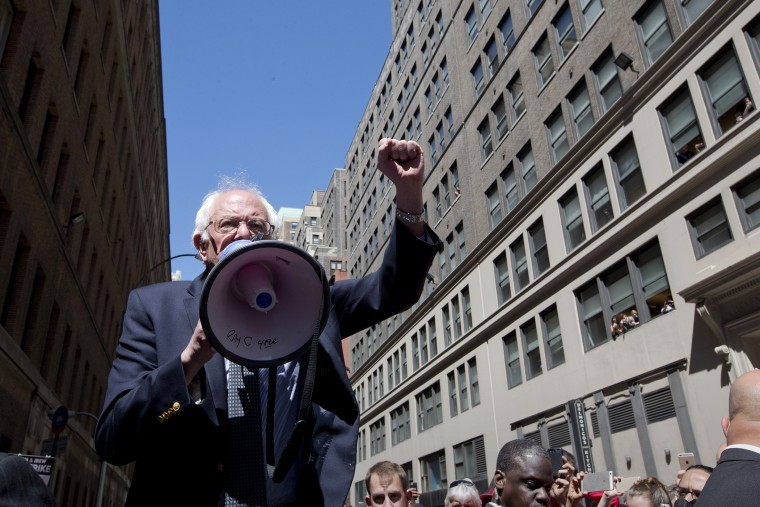As important as the results were from New York's presidential primaries, nearly as striking was an interview that aired live on MSNBC last night.
It's worth noting that some of the top people in the Sanders campaign may not be unanimous on this front. Tad Devine, Sanders' senior adviser, told reporters last night that after next week's five primaries, the campaign will "assess where we are." That's generally not a phrase campaign professionals use when getting ready to fight on, no matter what.
But around the same time. Weaver made a very different kind of argument. Kornacki walked through the delegate math with Sanders' campaign manager, trying to get a sense of how the senator intended to close the gap among pledged delegates. Weaver avoided specifics, probably because proportional delegate distribution makes it extremely difficult for Sanders to catch up to Clinton.
But ultimately, Weaver doesn't believe the senator has to catch up to Clinton at all -- because Sanders, his campaign manager argued, could still win the nomination even if voters side with Clinton.
The seven-minute clip is worth watching in its entirety, but I want to highlight the final exchange in particular:
KORNACKI: If June 7 comes and goes, and Hillary Clinton has won the pledged delegate count in the primaries, and she's won the popular vote, there are going to be calls from her campaign and calls from a lot of influential delegates in this country for you -- the Sanders campaign -- to make a decision to unite around her. You're saying instead of that, you will spend those months, those weeks in the summer, trying to flip superdelegates to Bernie Sanders before the convention. WEAVER: At this point, yes, absolutely.
There's no real ambiguity here. According to Bernie Sanders' campaign manager, the senator is prepared to urge party officials to give Sanders the nomination, even if that means overriding the will of the voters.
It's literally the exact opposite of what Sanders said at the beginning of the race, when the senator said the will of the voters must be honored, and the idea of powerful insiders giving the nomination to the candidate who came in second was considered outrageous.
To be sure, this strategy is not entirely new. A top Sanders aide told the Washington Post's Greg Sargent a month ago that the senator's campaign was prepared to encourage Democratic superdelegates to back Sanders, even if Clinton wins the most delegates and the most popular votes.
But Weaver was even more explicit on this point last night, adding an element of unexpected drama to the overall Democratic race.
Looking ahead, there are two additional angles to keep in mind. The first is what the Sanders campaign is suggesting is perfectly within the rules. It may seem out of bounds, and I don't doubt that some of Sanders critics were not pleased with Weaver's comments, but under the rules of the process, a candidate is well within his or her right to urge party officials to override the will of the voters.
It may not look good, and it may generate criticisms about being unprincipled, but there's nothing inherently illegitimate about Team Sanders trying this. They're not breaking or even bending any rules.
That said, if the situation were reversed, and Sanders won the voting process only to have Clinton urge party insiders to elevate her anyway, it's likely Sanders' supporters would be outraged -- and they'd have a point.
The second angle to remember, however, is that the Sanders campaign's gambit isn't likely to work. Superdelegates already appear to favor Clinton in large numbers, and the odds of these party officials, en masse, deliberately ignoring the will of the voters are vanishingly small.
